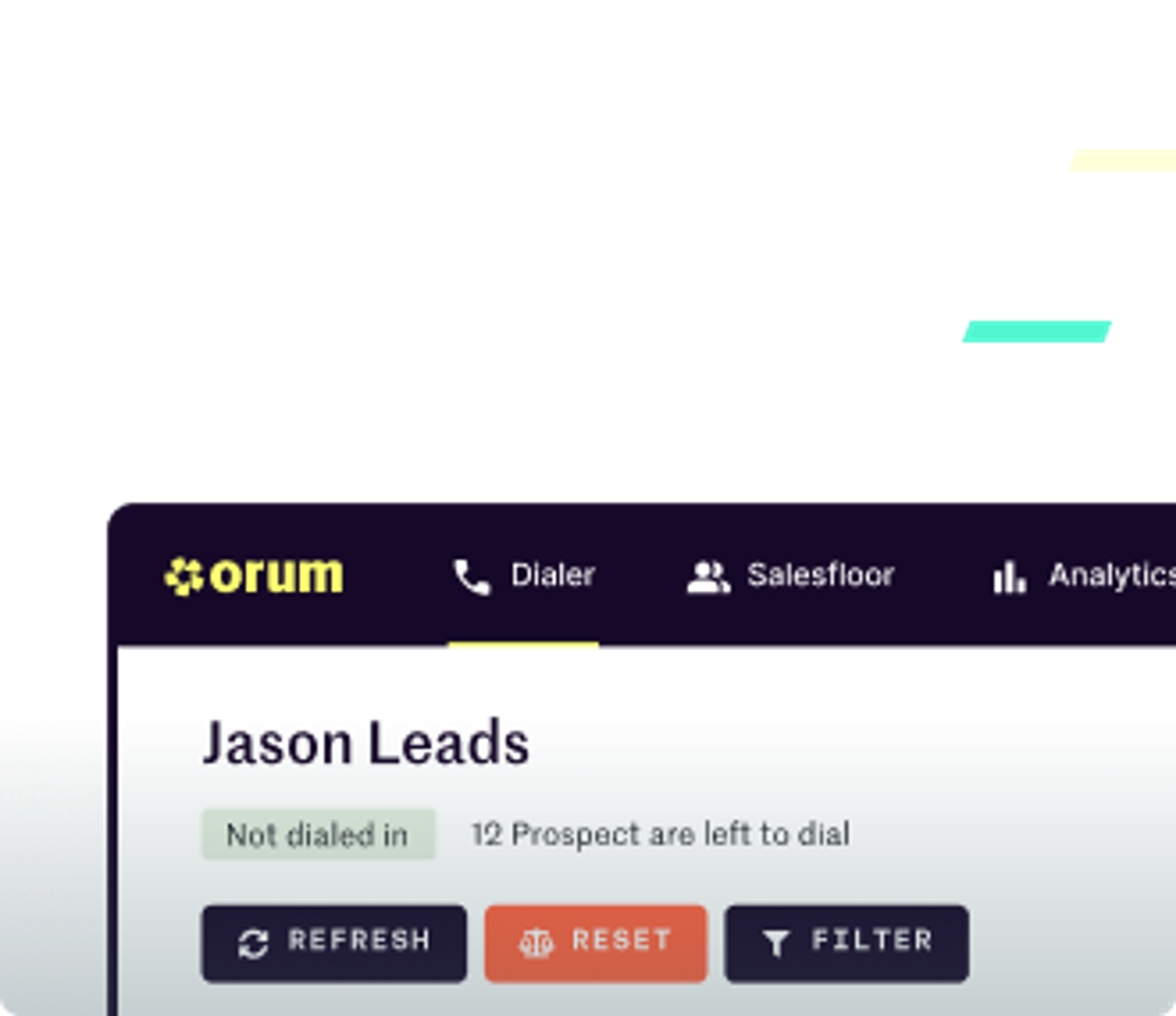How to Interview and Recruit a Great SDR Team


If you hire the wrong people, nothing, and I mean nothing, will save you.
I wish there was a playbook, tool, or management technique that could bail you out of the pain and suffering that comes with making a bad hire. Unfortunately, if you get this part of the process wrong, you will fail both quantitatively and qualitatively.
Sound fun? We're just getting started!
Here's a list of incredibly bad things that will happen if you hire the wrong people:
- Your team will almost certainly underperform and you'll miss your number.
- You'll spend more time with HR than you will with your team.
- Your top performers will most likely leave.
- You'll probably get fired.
- Everyone, including the people you hired, will probably hate you.
The good news is, if you hire the right people, you will not only build an awesome team, but build an incredible network of friends and talented coworkers that you'll carry with you for the rest of your career.
This article will go beyond the obvious, giving you an idea of what truly matters when it comes to hiring SDRs.
The difference
Hiring SDRs is fundamentally different from hiring for any other position in the company. Not only do many SDR candidates lack a work history to refer back to, ensuring that they have the skills to complete the job, you're also making a bet that they'll have the drive to stick with the job when times get tough.
Further complicating things, if you're hiring an SDR who has a background in sales development, it begs the question: “Why do they want to do this again?” If they have the skill, it may be a sign that they no longer have the will, and if they have the will, they may not have the skill.
Luckily, skill can be taught — whereas the will to do something cannot. In startups, you want to hire candidates that want to “punch above their weight class,” and therefore, I’d recommend building a team of entry-level or semi-entry-level SDRs with few exceptions.
With this in mind, it's important to look past the pattern-matching that's common when hiring for other positions. Career AEs with a great (and relevant) track record can indicate they will perform well at your company, but with SDRs you have to rely on cues that are less obvious.
Sourcing
In the beginning, you need a large, comparative pool of candidates to get a sense of what good looks like. This means you should be doing at least 10–15 phone screens a week with new candidates. I highly recommend at least two recruiting firms to ensure that your top-of-funnel stays full. While this might be a hard thing to sell to your management team, the money spent here has a fantastic ROI. Hiring the wrong person, or hiring too slowly, has catastrophic consequences. It's unlikely that a manager will have a network of entry-level candidates that's sufficient to build this type of pipeline.
Signing up with Betts Recruiting and another local recruiter of your choice is a great first step. Without sufficient sourcing, you won't have access to the amount of talent needed to make a proper hiring decision. It's important to get your management team on the same page. Help them understand that this isn't the same as hiring for other positions that can come through the company’s network.
Interviewing
When interviewing entry-level candidates, the first thing you need to understand is that interviewing itself is a skill, and this skill is aimed at separating your perception of the candidate from what they actually bring to the table long-term.
I remember being particularly terrible at interviewing as an entry-level candidate, largely due to the fact that I never grew up around the tech industry or the corporate world. I didn't know how to “speak the language,” and I really didn’t understand what the hiring manager was looking for. Conversely, a candidate who was brought up around the industry will understand the nuances that hiring managers look for and play into them.
Additionally, given that there is usually not a lot of relevant work history or performance metrics from which to base your decision, it is critically important to get a sense of the candidates’ life story to get a glimpse into their work ethic and motivation.
Life and background
After some small talk, I like to start off my interview by asking the following question:
This question has multiple benefits. First, it allows you to evaluate their innate storytelling skills, a trait that all great sales reps possess and is hard to acquire through training. It also gives them a chance to speak openly and confidently about a topic they are familiar with, which gives you a way to evaluate their communication skills and offers a glimpse of their motivations and drive.
The key to evaluating someone’s life story is not just to analyze its content, but to identify the narrative and role that they play within it. Ask yourself:
In comparative mythology, the “hero’s journey” involves a protagonist that goes on an adventure, is victorious in a decisive crisis, and comes home changed or transformed. This form of story-telling is indicative that the person in question is someone who defines themselves by overcoming difficult challenges, even when things get difficult. This is the exact trait needed while pursuing success in the SDR role.
If their narrative is uninspiring, or that of a lost and wandering victim, it's a sign that they are still trying to discover their purpose and motivation in life. A sales development team is a competitive and tough environment and isn't a good place to cultivate this trait.
Adversity and accomplishments
A candidate’s life story also exposes their life defining adversity and accomplishments. A follow-up question I always ask is:
Without exception, every great SDR I have hired has had a fantastic answer to this question. It's important to remember that you are not trying to hire everyone who wants the job, but you are trying to hire someone exceptional. Unfortunately, there are many young people who have been wandering through life, and have never truly accomplished anything exceptional. Your job is to find the diamond in the rough, and find candidates that have outstanding drive, motivation and talent.
When you hear an exceptional answer to this question it should be obvious, and one of the primary things you remember about the candidate. I’ll use an example from one of my early SDR hires at Rubrik, Sara Bookhamer.
Sara grew up in a tiny town in the middle of nowhere, California. While in college, she played on the women’s soccer team while also working at College Works Painting. Starting off, she had no idea what she was doing, and by the time she graduated, she was the number one rep on the west coast.
It was clear that Sara had a drive that went well beyond the average student. She went on to have a successful career at Rubrik, becoming a senior manager.
Another example that's less obviously related to sales was another early SDR hire, Andrew Novich.
Andrew wanted to be a professional race car driver when he was in high school, but his parents wouldn’t allow it. Andrew took it upon himself to raise money and find a coach, and ended up winning multiple races. His next step was to break into the corporate world so he could take his competitive drive to build a successful career in tech.
Andrew became a field AE at Rubrik and is now a regional sales manager at Zscaler. Andrew was not a normal kid; he was exceptionally competitive and driven.
Hire normal people and get normal results. Hire exceptional people and get exceptional results.
Diversity
Hiring a diverse team is not just the right thing to do, it also has a positive influence on performance. Building a diverse team requires you to be proactive and put additional thought into your interview.
We tend to be attracted towards people that remind us of ourselves, both physically and mentally. By frequently reminding yourself of this tendency, you can develop your senses more acutely to ensure you are judging people on merit rather than physical/cultural presentation. As an additional precaution, make sure your interview panel is diverse itself to safeguard against this natural bias.
Having diversity as a goal is another great justification for using external recruiters, since they will send you candidates that are outside of your culture and network.
Perhaps controversially, I believe that unconscious bias is a bit less likely to result in rejecting a qualified candidate, as it is more likely to permit a bad hire because they “look the part.” Many of us grew up in sales organizations full of tall, white sales “bros” and it can be hard to mentally remove that association when hiring entry-level sales reps. I’ve seen this type of bias even amongst hiring managers who do not fit this description themselves.
When thinking about whether this individual is cut out for sales, you might say something along the lines of “yea, I can see it…” which is a subconscious pattern match based on the visual memory of the sales floor you were trained in. I find it helpful to get the hiring panel in a room and white board out the pros and cons of a candidate to make sure your decisions are objectively defined.
SDR teams have the opportunity to be more diverse than the broader company, since you are not limited to a niche hiring pool that is already skewed by the historical makeup of the tech industry. Therefore, I think it's important to make this a proactive effort within your SDR recruiting initiative.
Why sales?
After you have determined that the candidate in question has exceptional character and drive, it's necessary to determine if a career in sales is a fit for them. While I have had many SDRs that have moved on to have successful careers in other departments within the company, I do believe that it is important that you hire SDRs that explicitly want to be in sales. If they decide later on down the road that they want to shift their career path into customer success, marketing or something else, that is fine, but you need to make sure their intentions are aligned right off the bat.
The SDR position is simply too hard if they are not driven to master the craft of being a sales professional. If they view the SDR position as a way to get a foot in the door and pursue other departments in the company, you will have a rep that is more interested in networking than being insanely successful at their job.
Candidates that are interested in sales (above all else) are usually attracted to the competitive and performance based nature of the job, and are highly motivated by success, recognition, and money. Some of the most dedicated reps I have ever hired held jobs in the past where they sat at a desk and were not paid based on performance, which greatly frustrated them. Great sales reps simply can’t see themselves doing anything else within a company. Their life story will illustrate that they tend towards being the “hero” in anything they try to do.
Most candidates, especially if they have been coached by a recruiter or family member, will claim that they want a career in sales, which makes this screening more difficult. A good work around here is to ask:
If their eyes don't light up or they do not have a good justification for being in a performance-based environment, it is usually a sign that they are not fully bought in.
Selling vs. expectations
Once you have identified a super talented candidate, it is likely that they will end up with multiple job offers. As the hiring manager, it is your responsibility to convince the candidate that working for you will be an awesome, life changing experience. It is important in this phase not to oversell the opportunity and set the wrong expectations of what the job will look like.
In fact, I think it is beneficial to reiterate the realities of the job as a further screening mechanism and to set the stage for a transparent relationship. I’d say something along the lines of:
Natural sales people respond well to this and you will set yourself up for an easier time managing expectations down the road.
As with every hire, it is important to sell them on the vision of the company and help them understand that they can be a part of this vision. In my previous article, CEO: Rethinking Sales Development, I talked about the importance of involving executives in the interview process to help your team stand out to top talent.
Conclusion
Hiring the right people is not the only thing that matters, but it's a necessary foundation for success that nothing can replace. By making decisions that expand your top of funnel, and using techniques to get to the bottom of a candidate’s ethos, you can put the odds significantly in your favor.
As years go by, the benefits of having a network of talented people that you initially recruited will pay back many fold. Many of these SDRs will end up working for you in different capacities if you move on to start your own company, and if they are really successful, they may even end up hiring you.
Choose wisely.
Jason Dorfman is the CEO & Co-founder of Orum and has spent 10+ years in startups, sales, and sales development. Previously, he was the first sales hire at Rubrik, where he built their WW inside sales and corporate sales teams, helping take Rubrik from 0 to $600M run rate in less than 6 years.





